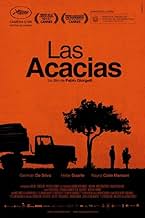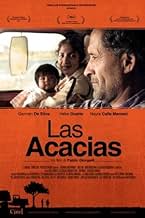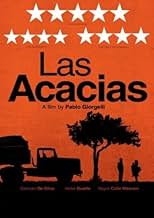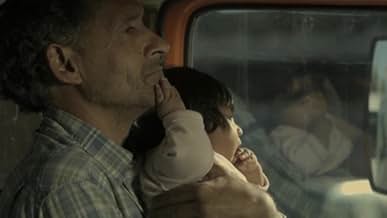IMDb RATING
6.9/10
2.5K
YOUR RATING
Reluctantly, a dour long-distance truck driver agrees to give a lift to a Paraguayan single mother and her five-month-old daughter to Buenos Aires. Can the palpable silence soften up the tac... Read allReluctantly, a dour long-distance truck driver agrees to give a lift to a Paraguayan single mother and her five-month-old daughter to Buenos Aires. Can the palpable silence soften up the taciturn trucker's sullen heart?Reluctantly, a dour long-distance truck driver agrees to give a lift to a Paraguayan single mother and her five-month-old daughter to Buenos Aires. Can the palpable silence soften up the taciturn trucker's sullen heart?
- Director
- Writers
- Stars
- Awards
- 19 wins & 22 nominations total
Germán De Silva
- Rubén
- (as Germán de Silva)
Matilde Jazmín Mamani
- Prima Anahí
- (as Matilde Jazmín Quispe Mamani)
Odón Morán López
- Camionero Paraguayo
- (as Odón Morán Lopez)
Darío Luchetta
- Camionero en asado
- (as Darío Lucchetta)
Yanina López
- Hija dueña parrilla
- (as Yanina Paz López)
- Director
- Writers
- All cast & crew
- Production, box office & more at IMDbPro
6.92.5K
1
2
3
4
5
6
7
8
9
10
Featured reviews
Only if you like non-commercial films!
I watched this film last night and I thought it is going to be boring. It wasn't the case in the end, because I felt like I was part of the journey, I was in the car and I couldn't hardly wait to get to Buenos Aires, and once there, I felt like I know my trip mates better. :) The baby was more than amazing! She's like a little star! I think when she'll grow up and see her performance she'll have all the reason to be proud for herself :) An achievement :)
It may seem like the whole film is event-less but I was positively surprised to see that the outcome was better then expected. I can easily imagine this to happen for real... Like I said I only recommend this film only if you're not infected with the holywoodian kind of "film".
It may seem like the whole film is event-less but I was positively surprised to see that the outcome was better then expected. I can easily imagine this to happen for real... Like I said I only recommend this film only if you're not infected with the holywoodian kind of "film".
Las Acacias
You don't know what they're thinking, you don't know how they're feeling, you can only guess. That's what makes this film intriguing and gives a "real life" feel to it. There is no background intrusive music, just the hum of a timber lorry lumbering (!) on the highway to Buenos Aires with its human cargo of man, woman and baby. One of the adults seems to have a lonely life without a family, the other one is part of a large and loving family, but there are hints of problems in their backgrounds. By journey's end you are hoping that all three will share a happy future together. By the way, there's no violence and only one brief bit of swearing.
EMOTIONAL ROAD MOVIE.
The tag line A man, a woman, A baby, 1500km writen on the film poster is more than enough to understand the plot. I have not watched any simpler movie than this one that carried the emotions in such raw form. Heartwarming film. I felt like I was sitting on a rear seat of the truck trying to get to Buenos Aires. Beautiful film.
Subtle but good
Las Acacias begins with the sound of a chainsaw followed by a lumberjack felling a fairly large tree. Many others fall and they are then loaded on to a tractor trailer. A man drives alone, lost in his thoughts, as he carries the cargo through the rural countryside. He stops at a truck stop to wash up and we can see a scar, curving from his back shoulder to his ribs. He steps outside to smoke a cigarette and a young woman approaches with a baby and asks if he is Ruben. He replies yes and that he was not told about the child. She explains that it is a misunderstanding and they get into the rig and Ruben seems less than thrilled with his passengers.
First stop, "welcome to Paraguay" on a sign and he tells her to get out and walk across the border and he will pick them up on the other side. He fills out the necessary paper work and then eats dinner alone. She gets back in and at the next stop the officers ask to see her papers and ask if she has the fathers permission to travel with her offspring. She answers that there is no father. Ruben takes the pair to a diner so that madre can feed little nina.
Back on the road, he finally asks her name, which turns out to be Jacinta and her child is Anani. She asks if he has a family, and at first he says no but then admits to having a son. On route he pays a short visit to his sister and afterwords finds a peaceful lake to sit beside with his passengers where they discuss mundane things like dogs, which they both like, and Anani's age which is five months. There is very little conversation, with most communication being non verbal. Both actors are very good at showing their feelings with facial expressions. As the drive progresses, Ruben grows more and more attached to Jacinta and Anani and as it nears the conclusion I actually cared what happened to them, which is a rare thing in most movies. I do not agree with the negative reviews posted, complaining about the lack of dialogue. Be patient and let the subtlety overtake you, as it did me.
First stop, "welcome to Paraguay" on a sign and he tells her to get out and walk across the border and he will pick them up on the other side. He fills out the necessary paper work and then eats dinner alone. She gets back in and at the next stop the officers ask to see her papers and ask if she has the fathers permission to travel with her offspring. She answers that there is no father. Ruben takes the pair to a diner so that madre can feed little nina.
Back on the road, he finally asks her name, which turns out to be Jacinta and her child is Anani. She asks if he has a family, and at first he says no but then admits to having a son. On route he pays a short visit to his sister and afterwords finds a peaceful lake to sit beside with his passengers where they discuss mundane things like dogs, which they both like, and Anani's age which is five months. There is very little conversation, with most communication being non verbal. Both actors are very good at showing their feelings with facial expressions. As the drive progresses, Ruben grows more and more attached to Jacinta and Anani and as it nears the conclusion I actually cared what happened to them, which is a rare thing in most movies. I do not agree with the negative reviews posted, complaining about the lack of dialogue. Be patient and let the subtlety overtake you, as it did me.
All the lonely people
In Paolo Giorgelli's quiet film 'Las Acacias', not a lot happens. A truck driver with a load of wood (hence the title) gives a lift, somewhat reluctantly, to a woman with a child. They don't talk a lot, but they're both lonely; by the end of the movie, they decide they'd like to see each other again. And that's it. The film covers a journey of 800 miles through South America, but there are no stunning landscapes on view: just a lot of scenes of two people sitting quietly in a cab. And yet, almost strangely, it doesn't drag: there's a feeling of truthfulness that compensates for the absence of action. In spite of being almost unremarkable by design, it's understated quality tells in the end.
Did you know
- TriviaFilmed in five weeks between Paraguay and Buenos Aires.
- ConnectionsFeatured in The Smallest Red Carpet, But the Biggest Heart (2011)
Details
- Release date
- Countries of origin
- Official sites
- Languages
- Also known as
- Akasyalar
- Filming locations
- Production companies
- See more company credits at IMDbPro
Box office
- Gross US & Canada
- $6,000
- Opening weekend US & Canada
- $6,000
- Sep 9, 2012
- Gross worldwide
- $355,979
- Runtime
- 1h 22m(82 min)
- Sound mix
- Aspect ratio
- 1.85 : 1
Contribute to this page
Suggest an edit or add missing content






















